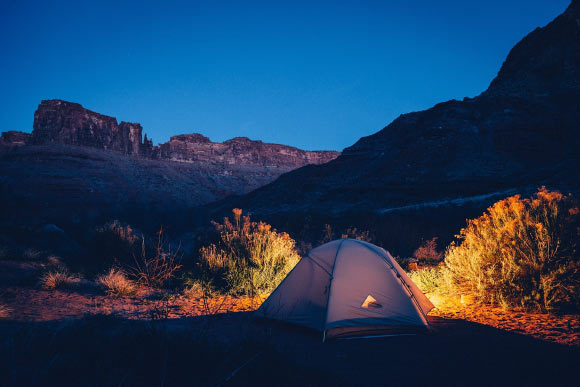New research published in the journal Current Biology shows that as little as 48 hours of camping can help re-set the body’s circadian rhythm, or internal clock, helping people fall asleep earlier.

According to Ellen Stothard et al, a weekend camping trip prevents the typical weekend circadian and sleep delay. Image credit: Unsplash.
“Our findings provide evidence that the human circadian clock adapts to seasonal changes in the natural light-dark cycle and is timed later in the modern environment in both winter and summer,” said Prof. Kenneth Wright of the University of Colorado Boulder and co-authors.
“Further, we demonstrated that earlier circadian timing can be rapidly achieved through natural light exposure during a weekend spent camping.”
Previously, to study the impact our modern light-filled environment – or lack thereof – has on our internal clock, Prof. Wright and colleagues sent volunteers camping for a week in the summer.
The participants were exposed to four times more light by day than usual and prohibited from using headlamps or flashlights at night. Upon return, the onset of melatonin – a hormone which promotes sleep and physiologically prepares the body for nighttime – came nearly two hours earlier, near sunset. It began to wane, signaling the biological day, earlier too.
In essence, the campers’ clock synced with the summer Sun.
“We have previously shown that exposure to a natural summer 14 hr 40 min:9 hr 20 min light-dark cycle entrains the human circadian clock to solar time, such that the internal biological night begins near sunset and ends near sunrise,” the authors noted.
But questions remained. Just how quickly does the clock change in response to shifts in our light environment? And how big of an impact do seasonal changes have on human biological rhythms?
To find out, the researchers conducted two experiments.
In the first, they recruited 14 volunteers: 9 went camping in Colorado’s Eagle’s Nest Wilderness for a summer weekend; 5 stayed home.
When the campers returned after just two days and had their saliva tested, their melatonin rise had shifted 1.4 hours earlier.
“Weekend exposure to natural light was sufficient to achieve 69% of the shift in circadian timing we previously reported after a week’s exposure to natural light,” Prof. Wright said.
Unlike their counterparts, who stayed up and slept in later than usual while at home, the campers maintained their regular sleep schedule, preventing the ‘social jetlag’ that contributes to Monday morning grogginess as a result from the clock shifting later over the weekend.
For the second experiment, five volunteers went camping for one week in Colorado’s Cache La Poudre Wilderness near the time of the winter solstice and returned to the lab to have their melatonin tested hourly for 24 hours.
Measurements showed they had been exposed to 13 times as much light by day as in their typical weekday environment during winter.
While camping, they went to bed earlier and slept longer. Upon return, their melatonin levels began to rise 2.6 hours earlier.
Without being thrown off by artificial light, their biological night had naturally lengthened to align with the season — as it does with many animals.
“This has been assumed but never demonstrated,” Prof. Wright said.
“When light hits photoreceptors in the eye, it alters the master clock which then signals a cascade of events that impact rhythms in our body, influencing not only when we sleep and rise, but also the timing of hormone releases that impact appetite, metabolism and more.”
“Delayed circadian and sleep timing has been associated with a host of health problems, including poor cognitive performance, mood disorders, diabetes and obesity. Our clock influences much more than sleep.”
“Even after a weekend of camping, people have to keep a regular wake and sleep cycle in order to retain the circadian reset they’ve gained,” he said.
For those who want to get their circadian rhythm back on track, but can’t get away for a camping trip, Prof. Wright and co-authors suggest getting more bright natural light by day and shutting off smartphones and laptops well before bedtime.
_____
Ellen R. Stothard et al. Circadian Entrainment to the Natural Light-Dark Cycle across Seasons and the Weekend. Current Biology, published online February 2, 2017; doi: 10.1016/j.cub.2016.12.041
This article is based on a press-release from the University of Colorado Boulder.







